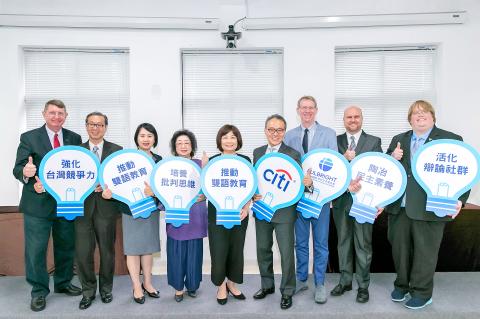To enhance the competitiveness and critical thinking abilities of young people, Citi Taiwan has joined forces with Fulbright Taiwan (Foundation for Scholarly Exchange) and the American Institute in Taiwan (AIT), as well as the US National Speech and Debate Association (NSDA) to launch an English debate education in line with the government’s policy to build Taiwan into a bilingual country by 2030.
“Citi Taiwan and Citi Foundation launched the ‘Pathways to Progress’ program in 2016, helping young people, ages 16-24, to cultivate entrepreneurial thinking, leadership, financial literacy and professional skills,” Citi Taiwan chairman Paulus Mok (莫兆鴻) said.
“To date, more than NT$36 million has been invested, supporting over 1,000 young talents to become career-ready and achieve their entrepreneurial dreams,” he said. “Debate is really an aspect of daily life. Whether we are communicating with family members regarding attitudes toward money, or convincing superiors to change his or her opinion in workplace, debate plays a part in everything.”

Photo courtesy of Citi Taiwan
“Debate involves the process of preparing points, evidence and arguments, and can nurture the ability to think critically, and to shape and convey viewpoints,” Mok said. “Through debate, young people can learn the essence of democracy — to forge consensus through mutual respect, making it an important force that drives society forward.”
“By organizing debates in English, Citi hopes to help young people enhance their soft power of English communication skills and develop a global vision, so that they become engaged with social issues, have an awareness of their global citizenship and speak out for themselves,” he added.
Fulbright Taiwan Foundation Scholarly Exchange executive director Randall Nadeau said that based on the US experience, “middle and high-school debaters subsequently occupy leadership positions in governmental, academic and business fields.”
“Today’s debaters become the effective democratic leaders of tomorrow,” Nadeau said. “This program will not only enhance international awareness of domestic and foreign policy issues between the United States and Taiwan, but also encourage mutual democratic values and serve as a mechanism for Taiwan to realize its goal of becoming a bilingual nation.”
National Development Council Minister Chen Mei-ling (陳美伶) expressed her gratitude to Citi Taiwan for working with Fulbright Taiwan, the AIT and the NSDA to promote the English Debate Education program.
As the government has been promoting the Bilingual National 2030 policy, it is very meaningful at this juncture that these private organizations have joined together to propose such an initiative for the very first time, Chen said.
Citi Taiwan has called for industry, academia, government and non-profit organizations to work together, introducing shared education resources and promoting debate.
In phase one, Citi and Fulbright Taiwan officials are to visit campuses nationwide to conduct in-depth discussions with students interested in debate.
In phase two, Fulbright Taiwan is to launch the “Fulbright Debate Coach/Trainer Awards” program, during which the Foundation for Scholarly Exchange is help select debate coaches and trainers, who will later visit eight to 12 senior-high schools in Taiwan and share strategies on how to train and refine communication skills, and improve critical thinking abilities.
A series of activities, such as seminars, debate tournaments and international debate camps are also to be organized, which are expected to benefit more than 500 senior-high students nationwide.

A strong continental cold air mass is to bring pollutants to Taiwan from tomorrow, the Ministry of Environment said today, as it issued an “orange” air quality alert for most of the country. All of Taiwan except for Hualien and Taitung counties is to be under an “orange” air quality alert tomorrow, indicating air quality that is unhealthy for sensitive groups. In China, areas from Shandong to Shanghai have been enveloped in haze since Saturday, the ministry said in a news release. Yesterday, hourly concentrations of PM2.5 in these areas ranged from 65 to 160 micrograms per cubic meter (mg/m³), and pollutants were

Taiwan’s armed forces have established response protocols for a wide range of sudden contingencies, including the “Wan Chun Plan” to protect the head of state, the Ministry of Defense (MND) said today. After US President Donald Trump on Saturday launched a series of airstrikes in Venezuela and kidnapped Venezuelan President Nicolas Maduro, concerns have been raised as to whether China would launch a similar “decapitation strike” on Taiwan. The armed forces regularly coordinate with relevant agencies and practice drills to ensure preparedness for a wide range of scenarios, Vice Minister of National Defense Hsu Szu-chien (徐斯儉) told reporters before a

EVA Airways on Saturday said that it had suspended a pilot and opened an investigation after he allegedly lost his temper and punched the first officer several times as their plane was taxiing before takeoff at Los Angeles International Airport. According to a report published on Thursday by The Reporter, the incident occurred after the flight’s Malaysian first officer tried to warn the Taiwanese pilot, surnamed Wen (文), that he was taxiing faster than the speed limit of 30 knots (55.6kph). After alerting the pilot several times without response, the first officer manually applied the brakes in accordance with standard operating

Japanese Councilor Hei Seki (石平) on Wednesday said that he plans to visit Taiwan, saying that would “prove that Taiwan is an independent country and does not belong to China.” Seki, a member of the Japan Innovation Party, was born in Chengdu in China’s Sichuan Province and became a naturalized Japanese in 2007. He was elected to the House of Concilors last year. His views on the Chinese Communist Party (CCP) — espoused in a series of books on politics and history — prompted Beijing to sanction him, including barring Seki from traveling to China. Seki wrote on X that he intends